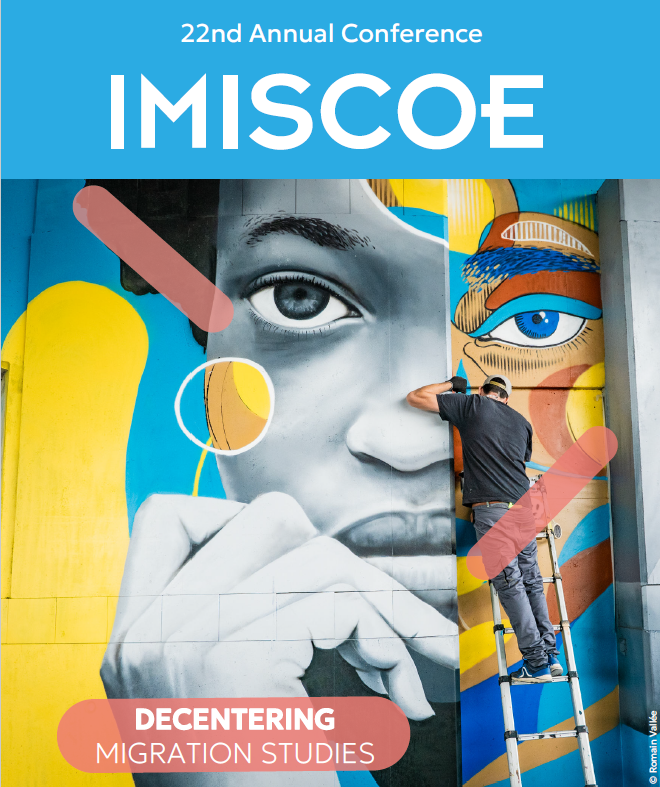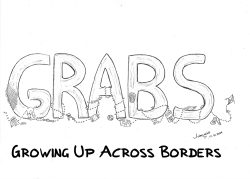
On 2nd July, the GRABS team hosted an online panel part of the 22nd IMISCOE Annual Conference Decentering migration studies, organised by the Institute Convergences Migrations, at Paris-Aubervilliers, France.
Our panel Growing Up Across Borders: Experience of Young People in Forced Migration was chaired by Jane, and the three papers presented included: Discussing the use of participatory methods with young people on the move, co-written and presented by Glenda and Izzy; Temporality and Age in Transnational Youth Forced Mobility, given by Jessi; and Recentring young people on the move’s lived experiences of forced migration: A decolonial, intersectional, and creative participatory study of the Canadian receiving context, presented by Juan Manuel.
Panel and papers presented in detail
This panel is based on the first results of a new ERC research project which aims to provide timely new research focusing on various aspects of the experience of young people growing up in a situation of forced migration and mobility across borders. The project aims to contribute research on youth migration and mobility, providing a theoretical and conceptual framework to understand the experiences of growing up across borders, whether physical or virtual, external or internal. Our analysis will move beyond conventional accounts of the linear migration journey from country of arrival to country of destination and will advance theoretical and empirical knowledge on the ways in these mobilities can be understood as more fragmented, non-linear and dynamic journeys, in much the same way as transitions from youth to adulthood. We adopt intersectional and post/decolonial lenses to de-centre the viewpoint and to avoid essentialising young people as “vulnerable”, whilst at the same time exploring the ways in which various structures of inequality create gendered and racist forms of violence, but also possibilities for agency and resistance. Employing innovative participatory methodologies we mobilise the concept of critical participatory action research as a way of ensuring that those most marginalized contribute direct knowledge to shaping and implementing research with the underlying belief that those most disenfranchised have a “right to research”. This panel brings together papers from different project members reflecting on linked aspects of our work.
PAPER #1
Discussing the use of participatory methods with young people on the move
AUTHOR(S)
Isabel Morrell and Glenda Santana de Andrade
ABSTRACT
At the end of 2023, 117.3 million people were forcibly displaced globally. If there is no age-disaggregated data available in relation to young migrants (aged 15 to 24) – evidence of the invisibilization of this group both in research and policy – many are young people. The latest United Nations World Youth Report for 2017 estimates, for instance, that youth made up 11 percent of all international migrants at that time, representing around 28 million individuals aged 15 to 24. Timely new research focusing on the multifaceted experiences of young people growing up in a situation of forced migration is of utmost need. When studying a population in a vulnerable condition and with limited rights, several questions however must be raised, in particular questions pertaining methods and ethics. In the past few decades, participatory approaches have been widely used in research with populations in conditions of vulnerability, which includes young people and migrants. But what are the specific challenges and practices of participatory research, both online and offline? What entails doing research with young people on the move? What are the ethical dilemmas at play ? This paper aims to clarify the obstacles, envisage good practices, and understand the limits of participatory methods. It will consider both traditional qualitative participatory approaches and more innovative digital methods, contributing to the theoretical and methodological debates around participatory research with young migrants growing up across borders.
PAPER #2
Temporality and Age in Transnational Youth Forced Migration
AUTHOR(S)
Jessi Kume
ABSTRACT
This paper aims to critically examine the role of temporality in shaping the experiences of young migrants in the context of forced migration. By investigating how time influences their lived realities, we reveal the complex challenges of precarity and vulnerability that these young people face.
Time is conceptualized not merely as a linear construct but as a multifaceted variable shaped by diverse social, political, and economic contexts. For many young migrants, temporal experiences are influenced by uncertainty stemming from bureaucratic processes, detention, prolonged waiting periods for documentation or the threat of deportation. These temporal challenges significantly impact how they navigate their transition to adulthood, as time is marked by extended periods of liminality—whether in border zones or within bureaucratic labyrinths. This analysis will explore the dual aspects of time as both a source of precariousness and a form of violence.
This paper seeks to contribute to a more nuanced understanding of young migrants’ experiences in forced migration contexts by foregrounding temporality and age as critical analytical frameworks. Drawing on existing scholarship, the paper will address the impact of temporal uncertainty in the lives of young migrants, particularly as they navigate chronic waiting, precarity, and instability. Importantly, age will be examined as an intersectional lens.
In conclusion, this paper aims to explore how time is experienced in transnational youth forced migration, particularly in border zones and contexts where internal borders may be reproduced. It will also investigate how these temporal variables shape experiences of privilege vs marginalization.
PAPER #3
Centring young asylum seekers’ lived experiences to inform migration policies: A critical intersectional comparative study of Canadian, South African and UK receiving contexts.
AUTHOR(S)
Juan Manuel Moreno
ABSTRACT
The increase in numbers, diversity and complexity of international migration challenges traditional notions and terms of access to the political and socio-economic fabrics of the State. Indeed, as critical feminist, postcolonial, decolonial, and Indigenous scholarships on migration show, these terms of access are historically colonial and racialised formations of inclusion-exclusion that endure to this day. Recent research shows that these exclusionary terms of access are shaped by current migration policy regimes based on externalization and violence (complex administrative systems, criminalisation of solidarity, securitisation of borders, exclusionary work and housing policies, etc.).
In this paper, I first examine what and how aspects of current migration regimes in Canada, South Africa, and the UK, are rooted in historical colonial and racialised formations. Second, I explore how young i asylum seekers’ and refugees’ knowledge and lived experiences can help understand the ways in which such migration policies and their implementation perpetuate colonial forms of violence and exclusion.
More often than not, migration policies are designed to exclude asylum seekers. This limits the capacity of policy-makers, social workers, scholars and activists to understand and address migrants’ lived realities; obstructs opportunities for alternative frames of action in policy; and upholds colonial and reductionist ideas of politico-legal membership and territoriality in contexts of increasing (in)mobilities of peoples and States’ sovereignty deterritorialization. In this research I take a critical intersectional approach to centre young asylum seekers’ agency and priorities for meaningful participation and positive social change as a fundamental human right.
